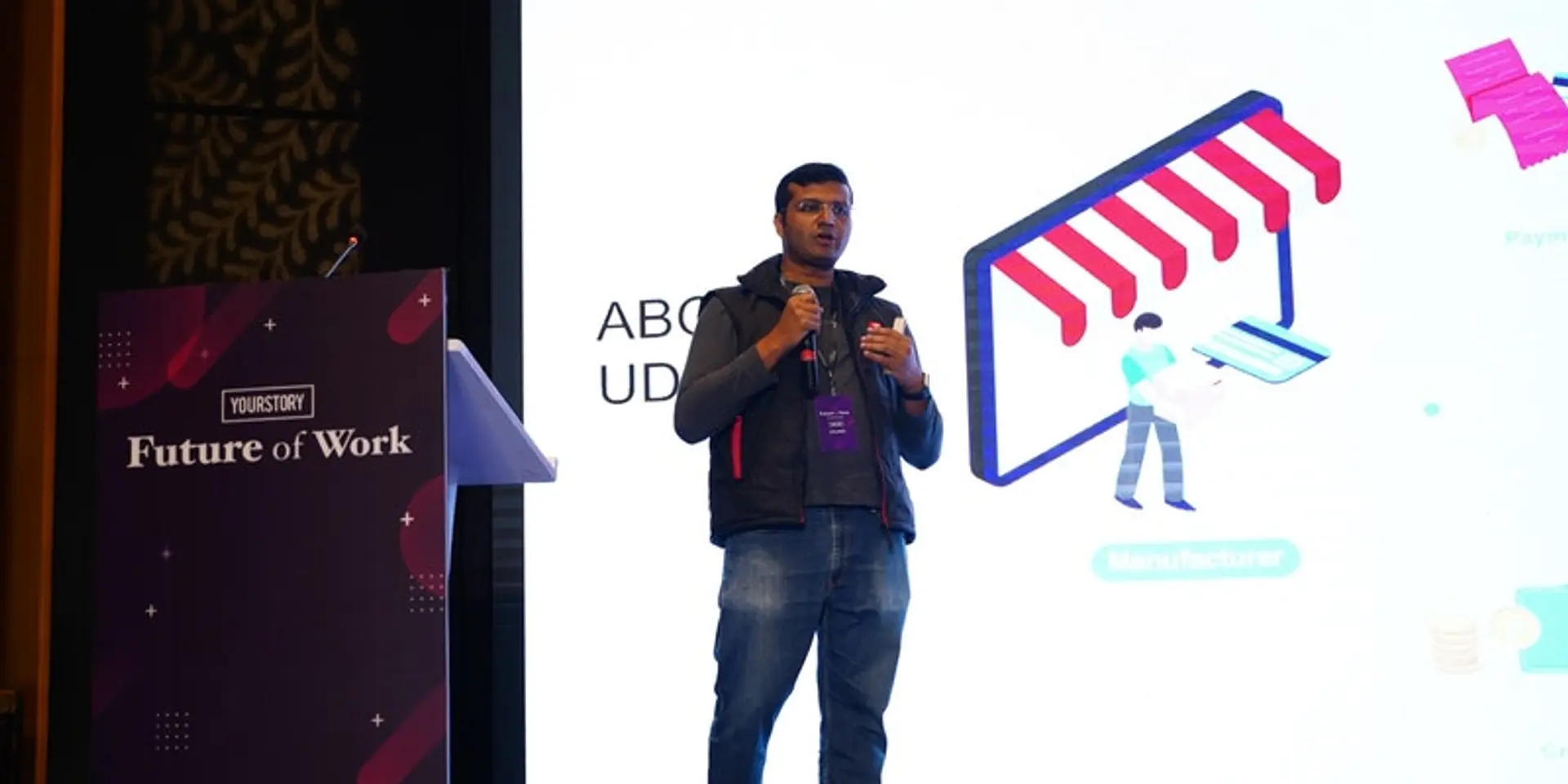Future of Work 2020: How to build for the Indian B2B retailer, explains Udaan's Abhilash Pillai
At YourStory's Future of Work 2020 conference, Udaan Product Manager Abhilash Pillai shared key learnings on building for the Indian retailer.
Designing products for B2C (Business to Consumer) ecommerce is relatively "easy", according to B2B (Business to Business) ecommerce startup 's Product Manager Abhilash Pillai.
“As a B2C consumer, you can visualise yourself as a consumer, so it's easy to design products for B2C consumer ecommerce, but in B2B, the challenge is that you need to know how the mind of the consumer works and how their mentality changes,” Abhilash said. He was speaking at the third edition of YourStory's Future of Work, India's largest product-design-tech conference, on Friday.
In his talk, Abhilash emphasised on how the world of the Indian retailer is very different from the B2C market.
“Their biggest challenge is adoption. The dependency of the B2B seller is strongly on the marketplace, hence adoption ends up dropping significantly,” he said.
Udaan wants tell the retailer that they do not have to leave their shop, for procurement or relationship building, they just have to come online, Abhilash said.

Udaan Product Manager Abhilash Pillai
Retail businesses, especially the everyday kirana or mom-and-pop stores see a lot of footfall. These stores are not only owned but also manned by the owners. And at any given point in time, there are at least five to six people asking for different products, items, and attention of the store-keeper.
Thus, throughout the day, these store-keepers and owners not only have to manage the everyday operations of their stores, but also ensure things like stock, products' safety etc.
"Now in many kirana stores, there isn't much active involvement by the owner or store keeper. The sellers come in check what is needed, make the list and leave. But then there also are retailers in fashion, clothing, and footwear, who are actively involved in procurement. These retailers have to travel to the seller markets and buyers are also fine with it, because these are high touch and feel kind of products," Abhilash said.
How to make retailers adopt tech
Today most retailers need a solution that makes their lives easier and are very active in conversations, but they simply do not convert as consumers, Abhilash pointed out. The team at Udaan realised that these retailers want a solution that has lesser adoption challenges and want convenience.
Citing an example of how the startup made it simpler for retailers, Abhilash spoke about the sugar businesses in Karnataka.
“With Udaan, the retailer was easily able to see the different sugar sellers on the platform, where they were, what prices were available. What this helped us do is take the product and display how it works to the shop keepers in real-time."
The retailers already realised that they needed to go online. But what made the adoption faster for Udaan was the introduction of GST (Goods and Services Tax) listings of the different tax structures on its platform.
Making the retailers use the product consistently
It is easy to get people to use the platform once or twice, but the challenge lies in getting them to use it multiple times, Abhilash noted. To get the retailers to buy online regularly, meant giving them "different nudges", he shared
“We thought why not match the offline demand that is there online at the same time. So instead of constraining yourself, give similar discounts and give two different days like for example - Monday and Thursday. And the response we saw was phenomenal. The communication has to be clear and simple,” said Abhilash.
He also emphasised the need for having "more feet on the street" to get the product going.
"If a buyer is not online or buying for three weeks, the team ends up sending feet on street to understand what the issue is. This also helped the team in understanding the gaps in the product."
While all these pointers help in the growth and stickiness of a retailer to a B2B e-commerce platform, what is critical is to have contingency plans for glitches in the system, as well as external factors, Abhilash said. Awarding sellers and helping them helps build trust, he added.
(Edited by Ramarko Sengupta)
A big shout out to our Future of Work 2020 Sponsors: Alibaba Cloud, Larksuite, Vodafone Idea Limited, , Adobe, , , , , , , Maharashtra State Innovation Society, and GetToWork; and our Knowledge Partner: Ascend Harvard Business Review.






